The online gaming world is growing fast, and people love the thrill of lottery and betting games. If you are looking for a fun, simple, and exciting way to win real money, then the 82 Lottery Game is just for you!
This platform is designed for both beginners and experienced players. With an easy-to-use interface, exciting games, and the chance to win big, 82 Lottery has quickly become a favourite among online betting enthusiasts.
Whether you want to test your luck, enjoy a fair and transparent gaming experience, or just have fun predicting, this game has it all. Plus, with fast payouts and a secure system, you can play with confidence.
In this detailed guide, you will learn everything about 82 Lottery, including how to download, register, play, and win.
GIFT CODE(Updates Every Day)
5CF7DFA5679B26D2E74B892C456G3138
| 📱 App Name | 82 Lottery App |
| 🎁 First Deposit Bonus | Up To ₹10000 |
| 📏 App Size | 6 MB |
What Is The 82 Lottery Game?
The 82 Lottery Game is an online colour prediction and lottery betting platform where users can bet on different colours, numbers, or outcomes and win real cash prizes.

The game follows a simple yet exciting format:
- Players place bets on a colour or number.
- The system generates a random result.
- If your prediction is correct, you win money!
Unlike traditional lotteries that take days to announce results, 82 Lottery is fast and instant, giving you multiple chances to win every day. The game uses advanced technology to ensure fair play, so every user has an equal chance of winning.
Features Of The 82 Lottery Game
82 Lottery stands out because of its exciting features that make it one of the best online gaming platforms.
- Simple Gameplay 🎮 – The game is designed for everyone, even beginners. No need to learn complex rules or strategies. You don’t need any special skills to play. The game is based on luck and probability, making it accessible to all players.
- Fast Results ⚡ – Unlike traditional lotteries, where you wait days for results, 82 Lottery provides results instantly. You can play multiple rounds in a single day, increasing your chances of winning.
- Win Real Money 💰 – Transfer your earnings directly to your bank account. The platform ensures transparent transactions without hidden deductions. Whether you play small or big, your winnings are yours to claim immediately.
- Multiple Games 🎲 – A quick and thrilling game for instant rewards. A fun way to test your luck with a spinning wheel of prizes. Choose your preferred style and enjoy multiple gaming experiences within one app.
- Safe & Secure 🔒 – The game uses advanced security protocols to keep your data safe. Deposits and withdrawals are protected using SSL encryption. Also, for those concerned about fraudulent activities, strict security measures prevent unauthorised access and fraudulent activities. The game follows fair play policies to ensure every user gets an equal chance to win.
- Quick Withdrawals 💳 – Cash out your winnings within minutes or hours. Choose your bank account and the amount and your money will be transferred to your bank account within 24 hours. Unlike traditional betting platforms, 82 Lottery ensures smooth and fast withdrawals.
- Fair & Transparent ✅ – The game results are generated using advanced randomisation algorithms, ensuring fairness. Every bet is transparent and unbiased, giving all players an equal chance to win. The system undergoes regular checks to maintain fair play and prevent cheating.
How To Download The 82 Lottery App?
For a better gaming experience, you can download the 82 Lottery app on your phone. Here’s how:
Way 1: Use The Add To Desktop Button
- Visit the official 82 Lottery website.
- Enter your credentials to log in to your game account.

- Find the “Add to Desktop” button and click on it.
- Allow installation from unknown sources in your phone settings.
- Install the app and open it.
Way 2: Use The “Direct Download” Option
- Go to the official 82 Lottery website.
- Login to your game account using your registered mobile number and password.
- Click on the “download” icon provided on the top-right corner of the screen.

- Allow installation from unknown sources in your phone settings.
- Install the app and open it.
The 82 Lottery app is designed to work smoothly, offering a fast, secure, and enjoyable betting experience.
How To Login To The 82 Lottery Game?
If you already have an account, logging in is super easy!
- Open the 82 Lottery app or visit the website.
- Enter your registered mobile number or email.
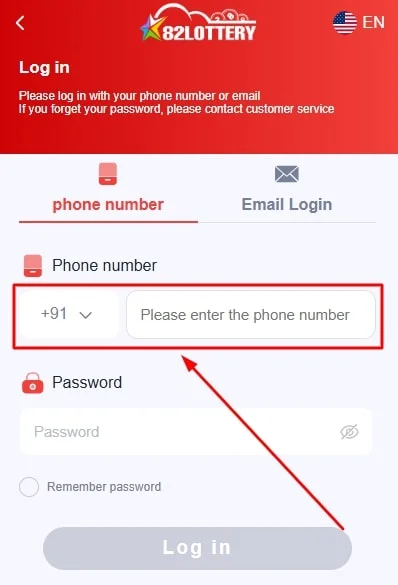
- Type your password.
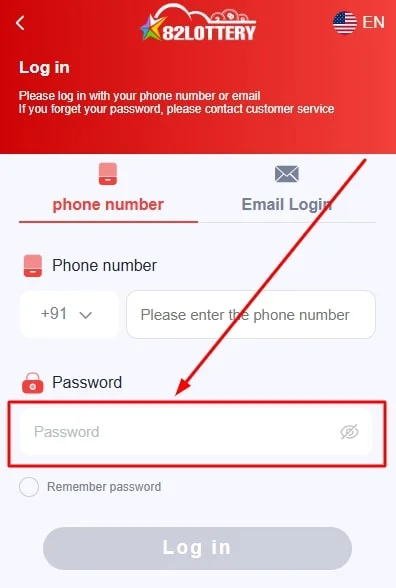
- Click “Login”.

Forgot Password? Click on “Forgot Password”, follow the instructions, and reset it instantly.
How To Register For The 82 Lottery Game?
New to 82 Lottery? You will need to create an account before playing. Follow these steps to sign up:
- Visit the official 82 Lottery website.
- Click on “Register”.

- Enter your mobile number. Ensure this number isn’t already registered on the platform.
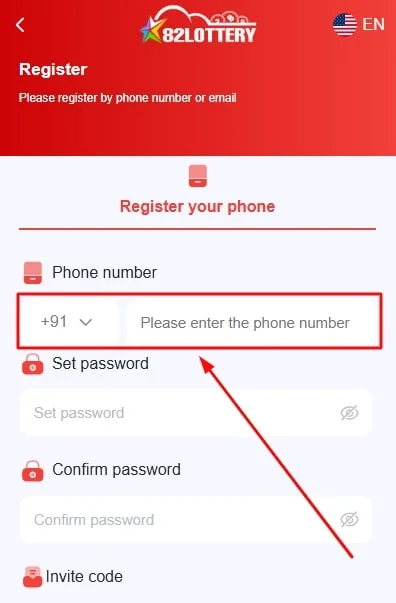
- Create a strong password for your account.
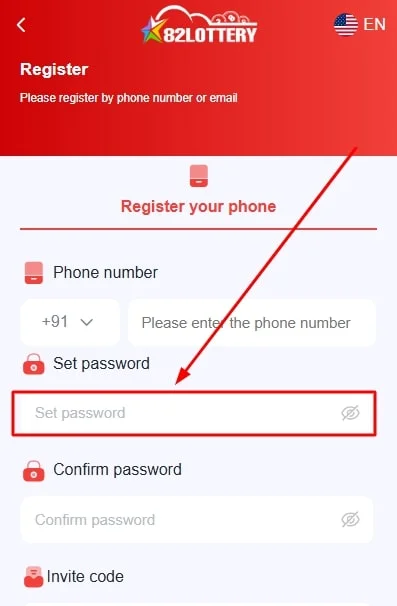
- Re-enter the password.
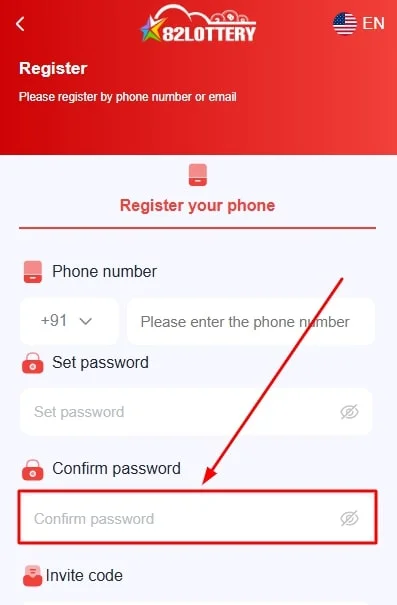
- Click ”Register” and your account is ready!
How To Deposit Money To The 82 Bet Game Account?
To place a bet on the platform, you need to add money. Here are the steps you have to follow:
- Login to the 82 lottery account.
- Click on the wallet section.

- Choose the Deposit option.

- Click on the payment method you are using. You can choose between bank transfer and USDT.
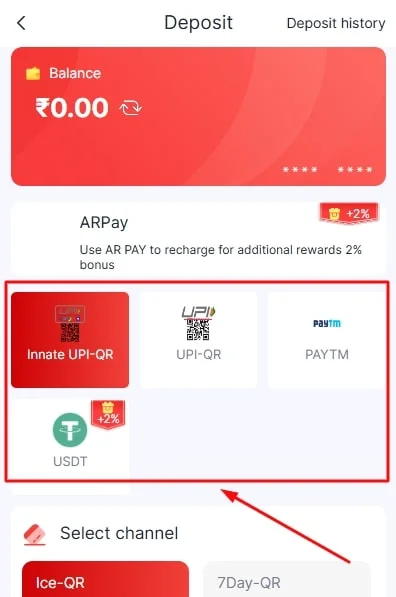
- Type the amount you want to add.

- Click on the “Deposit” option.

How To Withdraw Money From The 82 Lottery Account?
Withdrawing your winnings is a matter of seconds. Follow the steps listed below to withdraw money from your 82 bet account to the bank account.
- Login to the 82 lottery account.
- Click on the wallet section.
- Choose the “Withdraw” option.

- Click on the bank account you wish to transfer the money to. In case you have not added your bank account to the platform, begin by doing so.

- Type the amount you want to withdraw.

- Type your login password to confirm the transaction.
- Click on the “Withdraw” option.

How To Play The 82 Lottery Game?
Playing the 82 Lottery Game is very simple. Just follow these steps:
- Select a game mode 🎮 – Choose from different game types available on the app.
- Place your bet 💰 – Decide the amount you want to wager.
- Pick a colour or number 🎨 – Choose the option you think will win.
- Wait for the results ⏳– The system generates a random outcome.
- Win & withdraw 🏆 – If your choice is correct, you win real cash!
82 Lottery offers fast rounds, so you can play multiple times in a day.
Types Of Games Available On The 82 Lottery App
The 82 Lottery App offers different types of exciting games:
- Casino Games – If you love the excitement of Las Vegas-style gaming, the 82 Lottery Casino section is perfect for you. These games bring the authentic casino experience right to your screen.
- Rummy – Rummy is a skill-based game where players form valid card sets and sequences to win the round.
- Mini Games – Mini Games are fast-paced, easy-to-play games that offer quick rewards. These are perfect for players looking for instant action without long waiting times.
- Roulette – Roulette is one of the most popular casino games worldwide, and now you can play it on the 82 Lottery App. It is a luck-based game where players place bets on where a spinning ball will land on the roulette wheel.
82 Lottery Game Promote Mission
Games such as 91 Club, Daman and 82 Lottery game focus on keeping all their players engaged and offer them different ways to make money. One such way is the “promote mission”. In this mission, you become an agent of the 82 Bet game and you need to promote the app. A unique link is generated for you and once someone uses that link to download the game or sign up on the platform, you get some commission.
For those, who are interested in this mission, here’s how to enrol in the same:
- Login to the 82 lottery account.
- Go to the “promotions” tab.
- Once done, share the code as much as you can.
Conclusion
82 Lottery game is a great way to earn money for those who are looking for a source of passive income. The decent bonuses, refer and earn program and the availability of multiple games allow you to earn money in the way you like. However, one thing you need to note here is that the platform involves financial risks and one must make sure to keep finances in check while playing!
Frequently Asked Questions
Is the 82 Lottery Game legal?
Yes! The game follows fair play rules and ensures a secure gaming environment.
Can I win real money in the 82 Lottery Game?
Absolutely! If you predict correctly, you can win real cash instantly.
How do I withdraw my winnings?
Go to the Withdrawal section, enter your bank details, and receive your money quickly.
Can I play 82 Lottery on my phone?
Yes! Download the 82 Lottery app and enjoy gaming on your Android phone.
What if I forget my password?
Click “Forgot Password”, follow the steps, and reset it easily.
